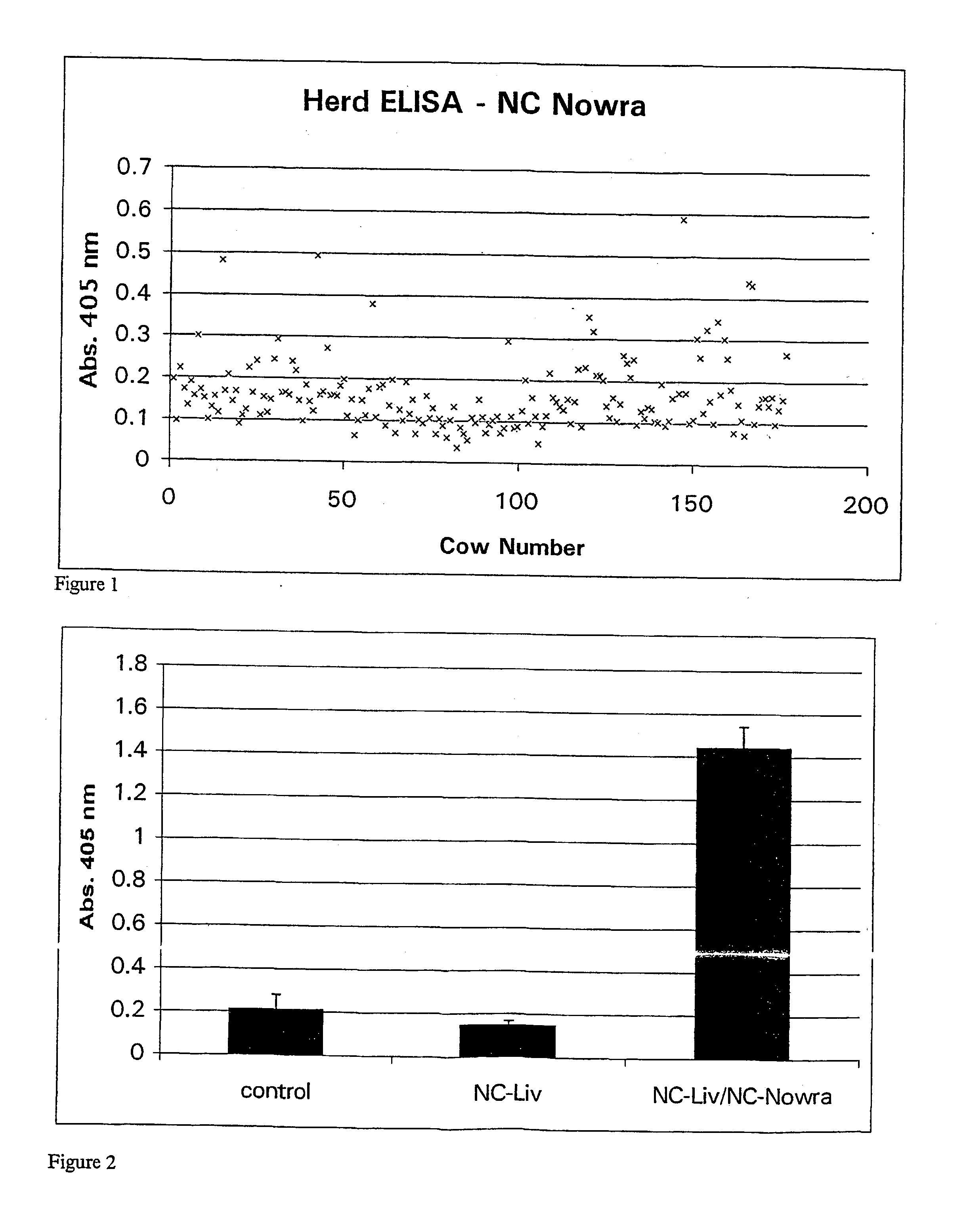Parasitic protozoan isolate
a protozoan and parasite technology, applied in the field of parasites, can solve the problems of inability to formulate a vaccine, inability to obtain bovine isolates, and inability to effectively prevent transplacental transmission or foetal loss, so as to reduce the possibility of congenital infections and prevent abortion.
- Summary
- Abstract
- Description
- Claims
- Application Information
AI Technical Summary
Benefits of technology
Problems solved by technology
Method used
Image
Examples
example 2
Characterisation of Isolated Organisms
[0066] Electron microscopy. Tachyzoites were recovered from in vitro culture and examined by transmission electron microscopy. Tachyzoites were fixed in 2.5% glutaraldehyde, 2% paraformaldehyde in phosphate buffer pH 7.2 for 2 hrs; washed three times with 0.1M cacodylate buffer and post-fixed in 1% aqueous osmium tetroxide. After excess fixative was removed by washing with water, parasites were dehydrated in ethanol, transferred to anhydrous acetone and infiltrated and embedded in Epon resin. The blocks were cut and ultrathin sections examined with a JEM 1010 transmission electron microscope. Tachyzoites were identified as N. caninum by virtue of their size, shape and internal structures including the presence of characteristic intracellular organelles such as electron dense rhoptries (Speer et al. 1999).
[0067] Western blotting. Tachyzoite lysates of Nc-Nowra, Nc-Liverpool and the ME49 strain of T. gondii were analysed by western blotting using ...
example 3
Nc-Nowra Tachyzoites Used in a Serological Test such as an ELISA
[0069] A dairy herd, located in the Southern Highlands of NSW, contained 177 Friesians with a history of abortion, with 37 abortions being recorded over 18 months spanning 1999 / 2000. There were two dogs and numerous foxes on this property, and N. caninum was previously diagnosed on the property by post mortem examination of aborted foetuses by NSW Agriculture. The herd is regularly and fully vaccinated against leptosporidiosis. The dairy herd was bleed for routine investigation of the cause of the abortions and these sera were screened for antibodies to Nc-Nowra using an indirect ELISA protocol developed at UTS and described below.
[0070] Nc-Nowra tachyzoites were recovered from in vitro culture and reduced to protein extracts by resuspension in lysis buffer (20 mM Tris pH 7.5, 150 mM NaCl, 1% Triton X-100, 1 mM PMSF, 2 mM DTT, 1 mM benzimidine HCl) and disruption by sonication at 50W / 20 KHz for 10-20 secs. The resulting...
example 4
A Cell Extract of Nc-Nowra Used to Induce an Immune Response in an Animal
[0072] Thirty (30) QS mice were divided equally into 10 groups, each of which received one of the following treatments, 4 weeks apart:
1 GROUP TREATMENT 1. None 2. Freund's incomplete adjuvant (FIA) alone 3. FIA + Nc-Nowra
[0073] Two (2) weeks after the second injection, mice were killed by CO.sub.2 asphyxiation, bled and their spleens removed for a cell proliferation assay.
[0074] An Nc-Nowra extract was made in the following way and used for either injection into animals or for ELISA. Nc-Nowra tachyzoites were recovered from in vitro culture and reduced to protein extracts by resuspension in lysis buffer (20 mM Tris pH 7.5, 150 mM NaCl, 1% Triton X-100, 1 mM PMSF, 2 ml DTT, 1 mM benzimidine HCl) and disruption by sonication at 50W / 20 Hz for 10-20 secs. The resulting preparation was dialysed against PBS overnight at 4.degree. C. with one change of buffer. Protein concentration was determined using the Bradford dy...
PUM
| Property | Measurement | Unit |
|---|---|---|
| concentration | aaaaa | aaaaa |
| concentration | aaaaa | aaaaa |
| concentration | aaaaa | aaaaa |
Abstract
Description
Claims
Application Information
 Login to View More
Login to View More - R&D
- Intellectual Property
- Life Sciences
- Materials
- Tech Scout
- Unparalleled Data Quality
- Higher Quality Content
- 60% Fewer Hallucinations
Browse by: Latest US Patents, China's latest patents, Technical Efficacy Thesaurus, Application Domain, Technology Topic, Popular Technical Reports.
© 2025 PatSnap. All rights reserved.Legal|Privacy policy|Modern Slavery Act Transparency Statement|Sitemap|About US| Contact US: help@patsnap.com

